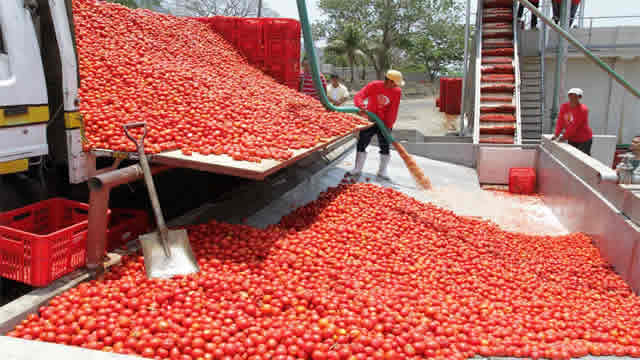
Stakeholders in agribusiness have raised concern over the increasing threat of post-harvest loss in the tomato value-chain, a development if not tackled with needed solution; is capable of frustrating policies on food security in the country.
Besides, the experts working under the Yieldwise Nigeria project worried over low budgetary allocation and inactive policy direction of government on agriculture in the five pilot states of Kaduna, Katsina, Kano, Jigawa and Plateau; where post-harvest loss in tomato and attendance consequences were evaluated.
Lending their voices at a policy view roundtable discussion in Kano, convened by a non-governmental agency TechnoServe, to share ideas on 50 per cent reduction in post-harvest loss in the Tomato Value-chain.
Project manager Yieldwise Nigeria, Mr. Olorunfemi Toyin noted the despite the comparative advantage of Nigeria in Tomatos production, the annual huge post-harvest loss, which accounted to more than 40 per cent of total local production remain critical concern.
Toyin attributed the post-harvest loss to poor productivity of farmers and lack of storage facilities to preserve large scale production in the country. Besides, Mr. Toyin stressed natural challenges of draught occasioned by climate change and flooding as major predicament worsen post-harvest loss of tomatoes in Nigeria.
“Tomatoes account for 20 per cent of Nigerias’ daily fruit and vegetable consumption, and the country has the second largest tomato production volume in Africa,” he said.
“Approximately 200,000 Nigerian farmers grow more than 1.8 million metric tons of tomatoes per year on approximately 170,000 hectares, falling short of domestic market demand for 2.3 million.
Until recently the gap of 500,000 MT off tomatoes was being filled by imports. The Yieldwise Nigeria project is committed to militating the challenges and building farmers capacity”.
Managing director JMSF agribusiness, Richard Ogundele posited that the five pilots states lack innovative policies to promote local agribusiness due to ineffective frame work.
Ogundele who conducted opportunities and challenges of tomatoes production in the five states, posited that post-harvest loss would remain eminence until government focus more on improved technologies and budgetary allocation.
” In all the five state where the research were conducted, budgetary allocation on agriculture is still below 5 percent. Farmers still lack capacity due to appalling ratio of extension worker to farmers.
“Government has not specific policies to promote tomatoes production. Rate at which commercial Banks grant farmers loan is high. How many farmers can afford to borrow at 30 per cent interest rate. So, we advice improved policies to accommodate public private partnership to grow agriculture in the country,” Ogundele stressed.
Ayokanmi Ayuba, Deputy country director of TechnoServe Nigeria, managing YieldWise Nigeria project explained that the post-harvest loss reduction in the Tomato Value-chain was part of sustainable agriculture mandate to improve the livelihoods of smallholders tomato farmers in Nigeria.
END

Be the first to comment